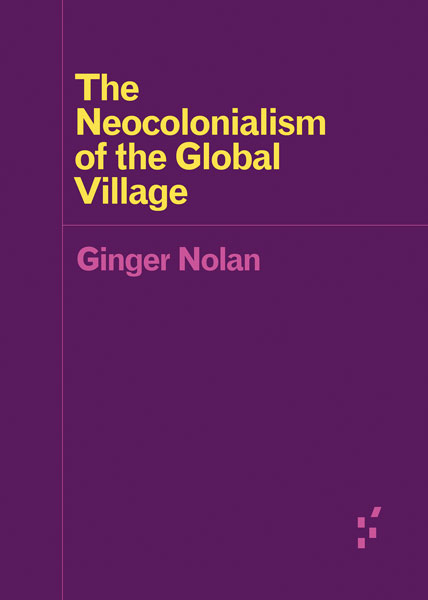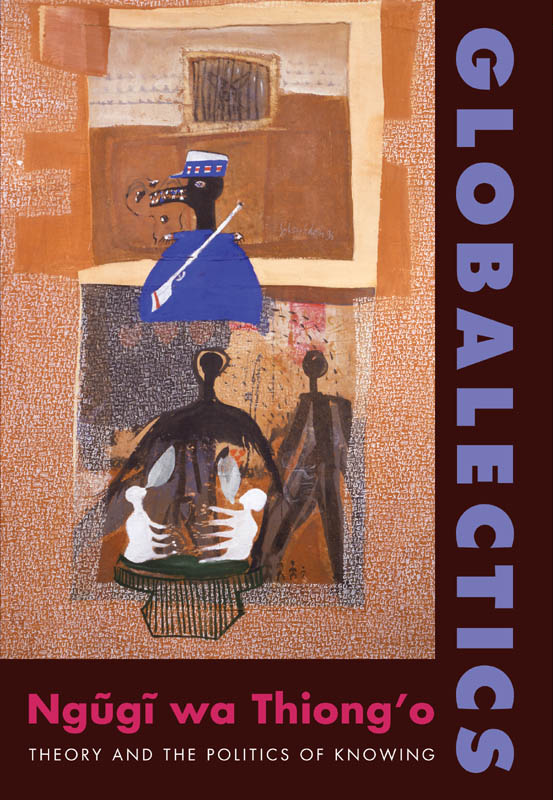Ginger Nolan: The Neocolonialism of the Global Village (2018)
Filed under book | Tags: · colonialism, global village, neocolonialism, power

“The term ‘global village’—coined in the 1960s by Marshall McLuhan—has persisted into the twenty-first century as a key trope of techno-humanitarian discourse, casting economic and technical transformations in a utopian light. Against that tendency, this book excavates the violent history, originating with techniques of colonial rule in Africa, that gave rise to the concept of the global village. To some extent, we are all global villagers, but given the imbalances of semiotic power, some belong more thoroughly than others. Reassessing McLuhan’s media theories in light of their entanglement with colonial and neocolonial techniques, Nolan implicates various arch-paradigms of power (including ‘terra-power’) in the larger prerogative of managing human populations.”
Publisher University of Minnesota Press, Minneapolis, 2018
Forerunners: Ideas First series, 25
Creative Commons BY-NC-ND 4.0 License
ISBN 9781517904869, 1517904862
69 pages
Ngũgĩ wa Thiong’o: Globalectics: Theory and the Politics of Knowing (2012)
Filed under book | Tags: · africa, dialectic, globalisation, knowledge, literary criticism, literary theory, literature, neocolonialism, orality, politics, postcolonialism, theory

“A masterful writer working in many genres, Ngũgĩ wa Thiong’o entered the East African literary scene in 1962 with the performance of his first major play, The Black Hermit, at the National Theatre in Uganda. In 1977 he was imprisoned after his most controversial work, Ngaahika Ndeenda (I Will Marry When I Want), produced in Nairobi, sharply criticized the injustices of Kenyan society and unequivocally championed the causes of ordinary citizens. Following his release, Ngũgĩ decided to write only in his native Gikuyu, communicating with Kenyans in one of the many languages of their daily lives, and today he is known as one of the most outspoken intellectuals working in postcolonial theory and the global postcolonial movement.
In this volume, Ngũgĩ wa Thiong’o summarizes and develops a cross-section of the issues he has grappled with in his work, which deploys a strategy of imagery, language, folklore, and character to ‘decolonize the mind.’ Ngũgĩ confronts the politics of language in African writing; the problem of linguistic imperialism and literature’s ability to resist it; the difficult balance between orality, or ‘orature’, and writing, or ‘literature’; the tension between national and world literature; and the role of the literary curriculum in both reaffirming and undermining the dominance of the Western canon. Throughout, he engages a range of philosophers and theorists writing on power and postcolonial creativity, including Hegel, Marx, Lévi-Strauss, and Aimé Césaire. Yet his explorations remain grounded in his own experiences with literature (and orature) and reworks the difficult dialectics of theory into richly evocative prose.”
Publisher Columbia University Press, New York, 2012
Wellek Library Lectures in Critical Theory series
ISBN 9780231159500, 0231159501
xi+104 pages
Reviews: Publishers Weekly (2011), Corbin Treacy (Transnational Lit, 2012), Danson Kahyana (Slip, 2012), Geoff Wisner (Words Without Borders, 2012), M.A. Orthofer (Complete Rev, 2012), Jenna N. Hanchey (E3W Rev of Books, 2013), Devin Zane Shaw (Society+Space, 2013), Magalí Armillas-Tiseyra (E-Misférica, 2014), Oliver Lovesey (Cambridge J Postcolonial Lit Inquiry, 2014), Ndiritu Wahome (2016).
Comment (0)Rasheed Araeen, Sean Cubitt, Ziauddin Sardar (eds.): Third Text Reader on Art, Culture and Theory (2002)
Filed under book | Tags: · art, art criticism, art history, culture, decolonization, ethnocentrism, eurocentrism, language, modernism, multiculturalism, neocolonialism, neoliberalism, poststructuralism, semiosphere, theory

“Third Text has been the world’s leading journal on art in the global context. Known for challenging received notions of art practice, art history, popular media and cultural theory, it has never accepted unquestioningly the claims of anti-racism, multiculturalism or postcolonialism. Similarly, Third Text has not only championed new artists from six continents, it has raised the critical temperature and the political stakes for art and cultural practice in the age of globalization. This Reader brings together classic essays by some of the best-known critics in global art and cultural studies, together with some of the most exciting new voices to emerge over the last decades. Divided into sections that cover history, representation, identity, film, “post” theory, globalization, the Reader will be invaluable to students and teachers of art, cultural studies, media studies, postcolonialism and globalization.”
Selected contributors: Zygmunt Bauman, Rustom Bharucha, Zeynap Çelik, James Clifford, Sean Cubitt, Jimmie Durham, Clifford Geertz, Stuart Hall, Kobener Mercer, Benita Parry, George Ritzer, Edward Said, Ziauddin Sardar, Julian Stallabrass, Slavoj Zizek.
Publisher Continuum International Publishing Group, 2002
ISBN 0826458513, 9780826458513
392 pages
PDF (no OCR; some pages missing; updated on 2012-11-4)
Comment (0)
